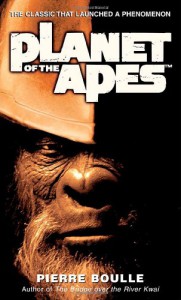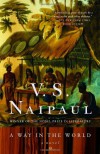Returning to the Future: Re-Reading Classic Science Fiction

I read Boulle's Planet of the Apes years and years ago, and I remember really enjoying it without knowing quite why--except that it was better (of course) than the movie(s). Last semester, I was designing a class called 'Science Fact and Fiction,' which combines science writing with science fiction, showing where the boundaries are blurred but also how science fiction can often express the same ethical concerns (chiefly through metaphors) that you find in the majority of science writing. I wanted a book that connected somewhat with Skloot's The Immortal Life of Henrietta Lacks and for some reason this book came up. So I assigned it without re-reading it, knowing I would get to it eventually and that, somehow, the connection would make sense.
And it did--just more than I realized. Planet of the Apes is an astounding book which is at once full of ideas and philosophy, but also a cracking good read--I literally could not put the book down, even though I remembered all the plot points. What surprised me most was the frame story which is removed from the film (as are many other prominent features): a vacationing couple is traveling through space in a kind of cosmic sail boat, and they run across a message in a bottle: the message, written in an obscure Earth language (French), contains the entire story. And strangest of all, it claims to be about human beings. The couple is very amused by this, and later we find out why (and you probably have as well).
The gist of the story is the journalist, Ulysse Merou, who travels across space with two companions to discover new worlds and escape the human race. Coincidentally, they find another earth-like planet full of people...who are little more than animals. He is soon captured and caged, made to mate in public and beg for food by his captors, the various groups of apes on planet Soror: the governing gorillas, the official orangutans, and the scientist chimpanzees. Using his knowledge of mathematics, he establishes contact with Zira, one of the head scientists, and convinces her of his humanity--or in this case, 'apeness.' She leads a secret crusade to turn the tables on the tradition-bound orangutans, and prove that man is an intellectual animal like themselves. Once he proves this to the simian world, Ulysee goes on an archaeological expedition with Zira's fiance, Cornelius, to unearth the remains of a 10,000 year-old city once populated by...humans.
Far from being a mere escapist fiction, the book uses the metaphor of apes to explore many issues humanity was facing in the 60's, such as race, scientific progress, the intellectual capability of mankind, and the foundations of education itself. One of the central arguments of the book is how easily we can slide from our intellectual heights to the slime of savagery; mankind is not superior, but must work at it, and is always in danger of falling prey to convention and political agendas. The fate of mankind may seem a bit far-fetched in the book, but again, the work is a metaphor for Boulle's own fears of how easily we abandon the life of the mind for mere comfort--a classic science-fiction theme also explored in Wells' The Time Machine.
But despite all my protestations of its greatness and importance, at the end of the day it's simply a well-written, exciting, living work. You believe in it, though the science is a bit improbable and Ulysse can be a somewhat exasperating narrator. Best of all, it's short and makes its point very succinctly--something a lot of modern-day authors could learn from! I can't recommend it highly enough, and hope some of my students enjoyed it as much as I did (the verdict is still out on that one...)










